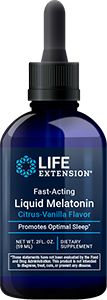
Is There Melatonin in Food?
Published: November 2022
On restless nights, you might've turned to a melatonin supplement as a sleep aid. But if you like to wind down the evening with a bedtime snack, perhaps you've wondered whether you can get melatonin from food.
The answer is a bit complicated. Yes, it is in some foods—like the glass of warm milk you probably recall being given when you were a sleep-resistant child. Melatonin is also in cherry juice (which is perhaps why it's currently a viral topic on TikTok, apparently uniting millions of Internet night owls!).
But, unlike a melatonin supplement, melatonin isn't standardized in food—meaning, the amount of melatonin may vary wildly from one type of food to the next. Even when it's the same food, one crop of tart cherries can have different levels of melatonin than another.
Which takes us to another question: what is melatonin, exactly? What does it do to your body, how does it help you sleep, and is it better to supplement, to eat melatonin-rich foods, or a combination of both? Let's dive in—plus, we'll share a list of the foods that naturally contain the famous "sleep hormone."
What is melatonin and what does it do for you?
Melatonin is a hormone which your body releases as a response to darkness. Primarily, it comes from the pineal gland, in your brain. On the contrary, when you're exposed to light, your body produces and releases less melatonin. This is why melatonin plays an important role in your circadian rhythm, which is your body's internal 24-hour clock.
Your body gets tired in response to an increase in melatonin—or, it stays awake in response to a lack of melatonin. (And you probably don't need us to tell you how important sleep is to your overall mental and physical health!)
While the discussion around melatonin usually focuses on sleep, we'd like to note that the hormone might also benefit your health in other ways. For example, it can help keep your mood upbeat in the winter, when there's not a lot of natural light; it also helps protect eye health, and has even been linked to healthy digestion.
And because melatonin also has antioxidant properties, and it can help keep your immune system strong and support a healthy inflammatory response. (This is because antioxidants protect our cells from oxidative stress, keeping them functioning properly.)
Do Cell Phones Make It Hard to Sleep?
A conversation about melatonin isn't complete without talking about cell phones. Why? Because these tiny screens emit blue light. Now, blue light is everywhere; you're exposed to it from the sun and lightbulbs. But one of the biggest producers is from the LED technology that's in our smart phones—along with our computers and TVs.
Indeed, the blue light from those screens can disrupt your melatonin levels. One poll from the National Sleep Foundation found that about 40% of Americans are on their phone while they're trying to fall asleep. Meanwhile, 60% of participants polled said they use a computer within an hour of heading to bed. Here's why it matters in regard to this hormone: light-emitting devices have been found to inhibit melatonin, impacting sleep, circadian rhythm timing, and alertness the next morning.
So, let's recap: You need your body to produce and release melatonin before bedtime so that you can sleep better. Many of us are using our devices right before bed, which impacts melatonin production and release. If we want to sleep longer and better—and to reap the many health benefits of being well-rested—helping our bodies release the necessary level of melatonin is a must!
14 foods high in melatonin
Even if you're in great health and stay off your devices before bed, our bodies produce less melatonin as we age. So, finding ways to get this very special hormone elsewhere becomes important. Fortunately, we can get a slight melatonin boost by snacking on certain foods (see the yummy list below.)
Here are 14 common dietary sources:
- Eggs
- Salmon and other fatty fish
- Nuts (like pistachios or walnuts)
- Sprouted legumes (like lentils)
- Seeds
- Cow’s milk
- Oats
- Corn
- Rice
- Tomatoes
- Carrots
- Soybeans
- Mushrooms
- Tart cherries
Explore Our Best Sleep Supplements
How much melatonin is in food?
It's hard to say much about the specific content of melatonin in different types of food! For any plant or animal dietary source of melatonin, everything from the temperature to sunlight exposure to farming techniques can make a difference in melatonin content. We do know a few things, though: nuts and herbs tend to consistently have a higher melatonin concentration than other foods, and corn is a pretty reliable source (which might explain why air-popped popcorn can hit the spot when you're winding down for the night with a favorite movie).
Pro tip: if you need sleep support, food alone probably isn't enough. While you can get extra melatonin from the food you eat, these foods contain relatively low levels of melatonin compared to what you'd get in a supplement. You'd have to eat a good amount of them, so supplementing with melatonin is typically much more practical than relying on the melatonin content in food.
What fruit is highest in melatonin?
Tart cherries (or tart cherry juice) are a go-to if you want to support your melatonin levels. Cherries contain melatonin in general, but tart cherries tend to have higher levels. If you prefer a more tropical fruit, you'll be happy to learn that in one study, eating pineapple was found to boost participants' melatonin levels (measured in their urine).
Tomato (yes, a fruit!) contains even more significant levels of melatonin, as do goji berries—widely considered a superfood because of its antioxidant content—especially when you compare them to other types of berries.
Is eating when you can’t sleep healthy?
Eating at night is generally not a good idea—even when the foods are high in melatonin, the function of digestion can mess with your body's circadian rhythm. Plus, the calories from that nighttime grazing can add up. But, your last meal of the day can be salmon or a mushroom omelet to pack in some extra melatonin, a snack of pistachios, or consider a glass of tart cherry juice instead of a night cap.
Three other ways to support your melatonin levels
How else can you naturally boost your body's production of the hormone to sustain a healthy level of the sleep-promoting melatonin? Check out these three simple tips.
Eat foods that are rich in tryptophan.
Tryptophan is an essential amino acid that's a precursor to melatonin and also converts into serotonin along the way. (Serotonin is sometimes called a "happy hormone" because it helps to support your mood.) Maintaining healthy levels of tryptophan can encourage healthy melatonin production. Foods with a higher tryptophan content include chicken, turkey, mushrooms, and leafy greens. (They're also nutrient-dense standbys of a healthy diet, too!)Maintain a consistent sleep schedule.
This means avoiding screen time at night, cutting back on your afternoon coffee (and other caffeinated drinks), and managing your stress levels. You should also aim to go to bed and wake up at roughly the same time every day.Get your workout in.
One small clinical study found that exercise might help to support the production of nighttime melatonin.
Which melatonin works the best?
When supplementing, you can get this hormone in different forms. Your two main options when it comes to the type of melatonin you take are extended and immediate release. Immediate release helps you get to sleep, while extended release helps you stay asleep. Both have a significant effect on sleep quality. If you want the best of both worlds, try Melatonin IR/XR, which provides the two forms combined—0.5 mg of immediate-release melatonin and 1 mg of sustained-release melatonin. This can help to improve both your sleep duration and quality.
Pro tip: More melatonin isn't necessarily better. Instead, if you want an extra boost of support, try incorporating ashwagandha, too. This ancient herb helps us better manage stress, so it can make a great partner supplement for melatonin. Melatonin is also available in gummies and liquid form and as capsules.
Psst! Not sure what sleep supplements you should try? Take our quiz and find out.
How to get better sleep: A checklist
If you're not getting enough quality sleep, the first step is to reevaluate your lifestyle habits:
- Are you avoiding caffeine later in the day? Coffee, tea and energy drinks can make it harder for your body to maintain its sleep cycle.
- Do you unplug from your gadgets at least a couple of hours before bedtime? Late-night scrolling on social media might very likely be contributing to your wakefulness.
- Are you eating any of the melatonin-rich food we talked about earlier, like tart cherries and pistachios? Try incorporating these into your diet.
- Are you creating a nighttime routine that signals to your body that it's time to sleep?
Try making a habit of things that relax you, like using an essential oil diffuser, taking a hot shower, or journaling. If your body is still having a hard time producing enough melatonin to get a good night of sleep, supplementing is a safe way to encourage your mind to settle down, promote your sleep-wake cycle, and slip into Dream Land. If melatonin doesn't feel like a good fit for you, try valerian root, which is an herbal supplement.
Be sure to consult your healthcare provider before starting any new supplement.
- Chang, Anne-Marie et al. "Evening use of light-emitting eReaders negatively affects sleep, circadian timing, and next-morning alertness." PNAS, December 2014, https://www.pnas.org/doi/10.1073/pnas.1418490112
- Changxian, Yi et al. "Effects of melatonin in age-related macular degeneration." Ann N Y Acad Sci., December 2005, https://pubmed.ncbi.nlm.nih.gov/16399908/
- Fatemeh, Gholami et al. "Effect of melatonin supplementation on sleep quality: a systematic review and meta-analysis of randomized controlled trials." J Neurol., January 2022, https://pubmed.ncbi.nlm.nih.gov/33417003/
- Kandil, Tharwat S et al. "The potential therapeutic effect of melatonin in Gastro-Esophageal Reflux Disease." BMC Gastroenterol, January 2010, https://pubmed.ncbi.nlm.nih.gov/20082715/
- Johns, Nutjaree Pratheepawanit et al. "Dietary intake of melatonin from tropical fruit altered urinary excretion of 6-sulfatoxymelatonin in healthy volunteers." J Agric Food Chem, January 2013, https://pubmed.ncbi.nlm.nih.gov/23252791/
- Lewy, Alfred J et al. "The circadian basis of winter depression." Proc Natl Acad Sci U S A, May 2006, https://pubmed.ncbi.nlm.nih.gov/16648247/
- Lin, Hsiao-Han et al. "Effect of kiwifruit consumption on sleep quality in adults with sleep problems." Asia Pac J Clin Nutr., 2011, https://pubmed.ncbi.nlm.nih.gov/21669584/
- Meng, Xiao et al. "Dietary Sources and Bioactives of Melatonin." Nutrients, April 2017, https://www.ncbi.nlm.nih.gov/pmc/articles/PMC5409706/
- Pacheco, Danielle. "How Electronics Affect Sleep." Sleep Foundation, April 2022, https://www.sleepfoundation.org/how-sleep-works/how-electronics-affect-sleep
- Pobocik, Kaylee M, PT, DPT et al. "Influence of Aerobic Exercise on Sleep and Salivary Melatonin in Men." International Journal of Sports and Exercise Medicine, April 2020, https://clinmedjournals.org/articles/ijsem/international-journal-of-sports-and-exercise-medicine-ijsem-6-161.php?jid=ijsem
- Sangsopha, Jintana et al. "Dietary sources of melatonin and benefits from production of high melatonin pasteurized milk." J Food Sci Technol., June 2020, https://pubmed.ncbi.nlm.nih.gov/32431329/
- Shoen, Sarah. "Sleep Benefits of Tart Cherry Juice." Sleep Foundation, April 2022, https://www.sleepfoundation.org/nutrition/tart-cherry-juice
- "Is Eating Before Bed Bad for You?" Cleveland Clinic, March 2022, https://health.clevelandclinic.org/is-eating-before-bed-bad-for-you/









